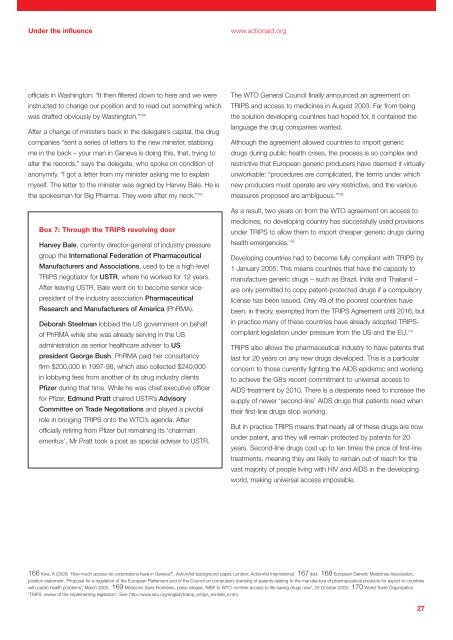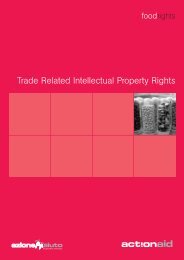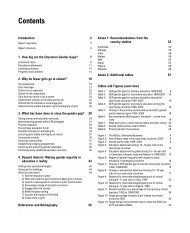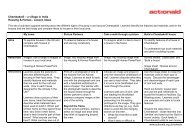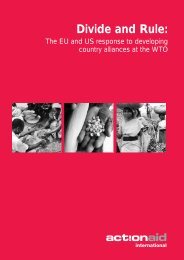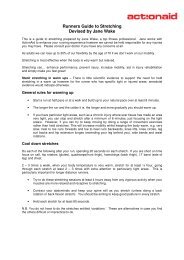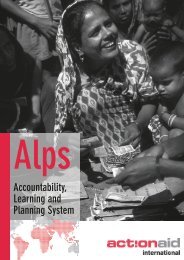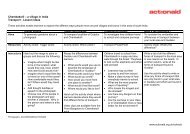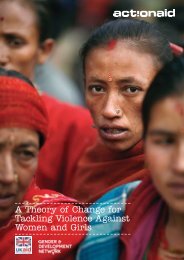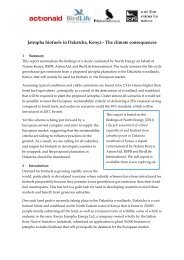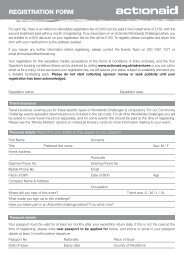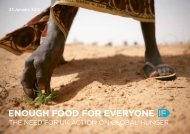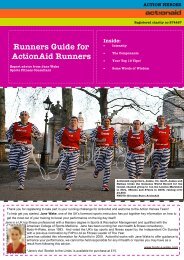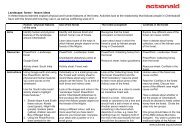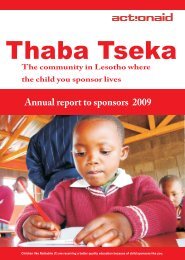UNDER THE INFLUENCE - ActionAid
UNDER THE INFLUENCE - ActionAid
UNDER THE INFLUENCE - ActionAid
Create successful ePaper yourself
Turn your PDF publications into a flip-book with our unique Google optimized e-Paper software.
Under the influence<br />
www.actionaid.org<br />
officials in Washington: “It then filtered down to here and we were<br />
instructed to change our position and to read out something which<br />
was drafted obviously by Washington.” 166<br />
After a change of ministers back in the delegate’s capital, the drug<br />
companies “sent a series of letters to the new minister, stabbing<br />
me in the back – your man in Geneva is doing this, that, trying to<br />
alter the records,” says the delegate, who spoke on condition of<br />
anonymity. “I got a letter from my minister asking me to explain<br />
myself. The letter to the minister was signed by Harvey Bale. He is<br />
the spokesman for Big Pharma. They were after my neck.” 167<br />
Box 7: Through the TRIPS revolving door<br />
Harvey Bale, currently director-general of industry pressure<br />
group the International Federation of Pharmaceutical<br />
Manufacturers and Associations, used to be a high-level<br />
TRIPS negotiator for USTR, where he worked for 12 years.<br />
After leaving USTR, Bale went on to become senior vicepresident<br />
of the industry association Pharmaceutical<br />
Research and Manufacturers of America (PhRMA).<br />
Deborah Steelman lobbied the US government on behalf<br />
of PhRMA while she was already serving in the US<br />
administration as senior healthcare adviser to US<br />
president George Bush. PhRMA paid her consultancy<br />
firm $200,000 in 1997-98, which also collected $240,000<br />
in lobbying fees from another of its drug industry clients<br />
Pfizer during that time. While he was chief executive officer<br />
for Pfizer, Edmund Pratt chaired USTR’s Advisory<br />
Committee on Trade Negotiations and played a pivotal<br />
role in bringing TRIPS onto the WTO’s agenda. After<br />
officially retiring from Pfizer but remaining its ‘chairman<br />
emeritus’, Mr Pratt took a post as special adviser to USTR.<br />
The WTO General Council finally announced an agreement on<br />
TRIPS and access to medicines in August 2003. Far from being<br />
the solution developing countries had hoped for, it contained the<br />
language the drug companies wanted.<br />
Although the agreement allowed countries to import generic<br />
drugs during public health crises, the process is so complex and<br />
restrictive that European generic producers have deemed it virtually<br />
unworkable: “procedures are complicated, the terms under which<br />
new producers must operate are very restrictive, and the various<br />
measures proposed are ambiguous.” 168<br />
As a result, two years on from the WTO agreement on access to<br />
medicines, no developing country has successfully used provisions<br />
under TRIPS to allow them to import cheaper generic drugs during<br />
health emergencies. 169<br />
Developing countries had to become fully compliant with TRIPS by<br />
1 January 2005. This means countries that have the capacity to<br />
manufacture generic drugs – such as Brazil, India and Thailand –<br />
are only permitted to copy patent-protected drugs if a compulsory<br />
license has been issued. Only 49 of the poorest countries have<br />
been, in theory, exempted from the TRIPS Agreement until 2016, but<br />
in practice many of these countries have already adopted TRIPScompliant<br />
legislation under pressure from the US and the EU. 170<br />
TRIPS also allows the pharmaceutical industry to have patents that<br />
last for 20 years on any new drugs developed. This is a particular<br />
concern to those currently fighting the AIDS epidemic and working<br />
to achieve the G8’s recent commitment to universal access to<br />
AIDS treatment by 2010. There is a desperate need to increase the<br />
supply of newer ‘second-line’ AIDS drugs that patients need when<br />
their first-line drugs stop working.<br />
But in practice TRIPS means that nearly all of these drugs are now<br />
under patent, and they will remain protected by patents for 20<br />
years. Second-line drugs cost up to ten times the price of first-line<br />
treatments, meaning they are likely to remain out of reach for the<br />
vast majority of people living with HIV and AIDS in the developing<br />
world, making universal access impossible.<br />
166 Kwa, A (2005) ‘How much access do corporations have in Geneva?’, <strong>ActionAid</strong> background paper, London: <strong>ActionAid</strong> International. 167 ibid. 168 European Generic Medicines Association,<br />
position statement, ‘Proposal for a regulation of the European Parliament and of the Council on compulsory licensing of patents relating to the manufacture of pharmaceutical products for export to countries<br />
with public health problems’, March 2005. 169 Médecins Sans Frontières, press release, ‘MSF to WTO: re-think access to life-saving drugs now’, 25 October 2005. 170 World Trade Organization,<br />
‘TRIPS: review of the implementing legislation’: See: http://www.wto.org/english/tratop_e/trips_e/intel8_e.htm.<br />
27


